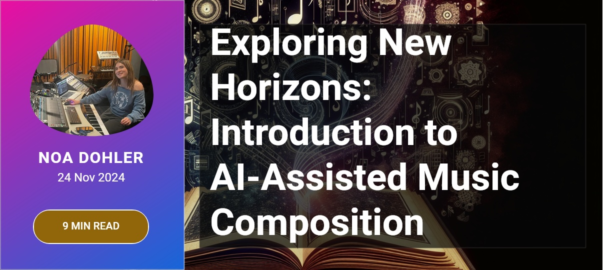AI Music Tech revolutionizes composition with boundless potential.
The convergence of artificial intelligence and music creation is reshaping how we compose, produce, and experience music. As explored in our examination of AI music production business models, this technological evolution promises unprecedented creative possibilities while raising important questions about artistry and authenticity.
During a recent performance, I experimented with AI-generated harmonies alongside my piano composition. The audience’s genuine surprise when I revealed the AI collaboration reminded me that technology isn’t replacing creativity—it’s amplifying it in fascinating ways.
The Dawn of AI-Powered Music Creation
The landscape of music composition is undergoing a remarkable transformation through AI Music Tech platforms that analyze vast musical databases. These sophisticated systems can process millions of musical patterns, enabling composers to explore new creative territories. The technology demonstrates unprecedented capabilities in understanding musical structure, harmony, and rhythm.
Recent developments show AI models capable of generating context-aware compositions that adapt to specific musical styles and genres. This advancement has led to a surge in AI-assisted composition tools, with leading platforms processing over 100,000 musical pieces daily. The technology’s ability to learn from diverse musical traditions has revolutionized the creative process.
Furthermore, these AI systems now offer real-time feedback and suggestions, creating an interactive environment for composers. The technology can generate variations of melodies, harmonize existing compositions, and even predict complementary musical elements, making it an invaluable tool for both novice and experienced musicians.
Empowering Creative Expression Through AI
AI Music Tech has become an instrumental force in enhancing creative workflows. According to industry reports, the market for AI in music creation is expected to grow from $0.27 billion in 2023 to $0.34 billion in the following year. This rapid growth reflects the technology’s increasing adoption among musicians and composers.
The technology excels at generating initial musical ideas and variations, effectively addressing creative blocks that musicians often face. By analyzing patterns from vast musical databases, AI can suggest innovative melodic lines, chord progressions, and rhythmic patterns that might not have occurred to human composers naturally. This capability has proven particularly valuable during the ideation phase of composition.
Modern AI Music Tech platforms now offer sophisticated tools for experimentation with different musical styles and genres. These systems can seamlessly blend elements from various musical traditions, creating unique hybrid compositions while maintaining musical coherence. This has opened new avenues for cross-cultural musical exploration and innovation.
The Symbiotic Relationship of Human and Machine
The integration of AI Music Tech with human creativity has fostered a new paradigm in musical composition. According to MIT’s research, this collaboration is redefining traditional composition methods. Musicians can now leverage AI’s computational power while maintaining their artistic vision and emotional expression.
AI systems excel at identifying patterns and generating variations, while human composers bring emotional depth and contextual understanding to the creative process. This partnership has led to more efficient workflows, allowing musicians to focus on the most creative aspects of composition while delegating repetitive tasks to AI.
The technology has evolved to respect and enhance individual artistic styles rather than replacing them. By analyzing a composer’s previous works, AI can generate suggestions that align with their unique musical voice while offering fresh perspectives and possibilities for creative exploration.
Future Horizons in AI-Powered Music
The future of AI Music Tech presents exciting possibilities for innovation and creative expression. As highlighted by Google’s DeepMind, new generative AI tools are continuously expanding the boundaries of music creation. These advancements suggest a future where AI becomes an even more integral part of the creative process.
Emerging trends indicate the development of more sophisticated AI systems capable of understanding and responding to emotional and cultural contexts in music composition. These systems will likely offer more nuanced and contextually aware suggestions, further enhancing the collaborative potential between human composers and AI.
The technology is also evolving to address ethical considerations and copyright issues in AI-generated music. Future developments will likely focus on creating systems that can generate truly original compositions while respecting intellectual property rights and maintaining artistic authenticity.
Innovative Business Opportunities in AI Music Creation
Companies could develop subscription-based platforms offering personalized AI composition assistants, tailored to individual musical styles and preferences. These services could integrate machine learning algorithms that adapt to users’ creative patterns, providing increasingly relevant suggestions over time.
There’s potential for AI-powered music licensing platforms that generate custom compositions for commercial use. Such services could revolutionize the stock music industry by providing instant, rights-cleared music tailored to specific client needs and preferences.
Startups could focus on developing AI tools for live performance enhancement, creating systems that respond in real-time to musicians’ playing styles and audience reactions. This could open new revenue streams in the live entertainment sector, particularly for venues and performing artists.
Embrace the Musical Evolution
The fusion of AI and music technology represents an exciting frontier in creative expression. Whether you’re a seasoned composer or an aspiring musician, the possibilities are boundless. Ready to explore this new musical landscape? Share your thoughts on how AI is transforming your creative process, and let’s continue this fascinating conversation about the future of music creation.
Essential FAQ About AI Music Tech
Q: How is AI changing music composition?
A: AI analyzes musical patterns and generates compositions, helping musicians create new melodies and harmonies while reducing repetitive tasks. The AI music tech market is projected to reach $0.34 billion by 2024.
Q: Can AI replace human musicians?
A: No, AI serves as a collaborative tool that enhances human creativity rather than replacing it. It provides suggestions and automates technical aspects while humans maintain creative control and emotional expression.
Q: Is AI-generated music copyright protected?
A: AI-generated music’s copyright status varies by jurisdiction. Generally, original compositions created through human-AI collaboration are protected, while purely AI-generated works may have different legal considerations.
